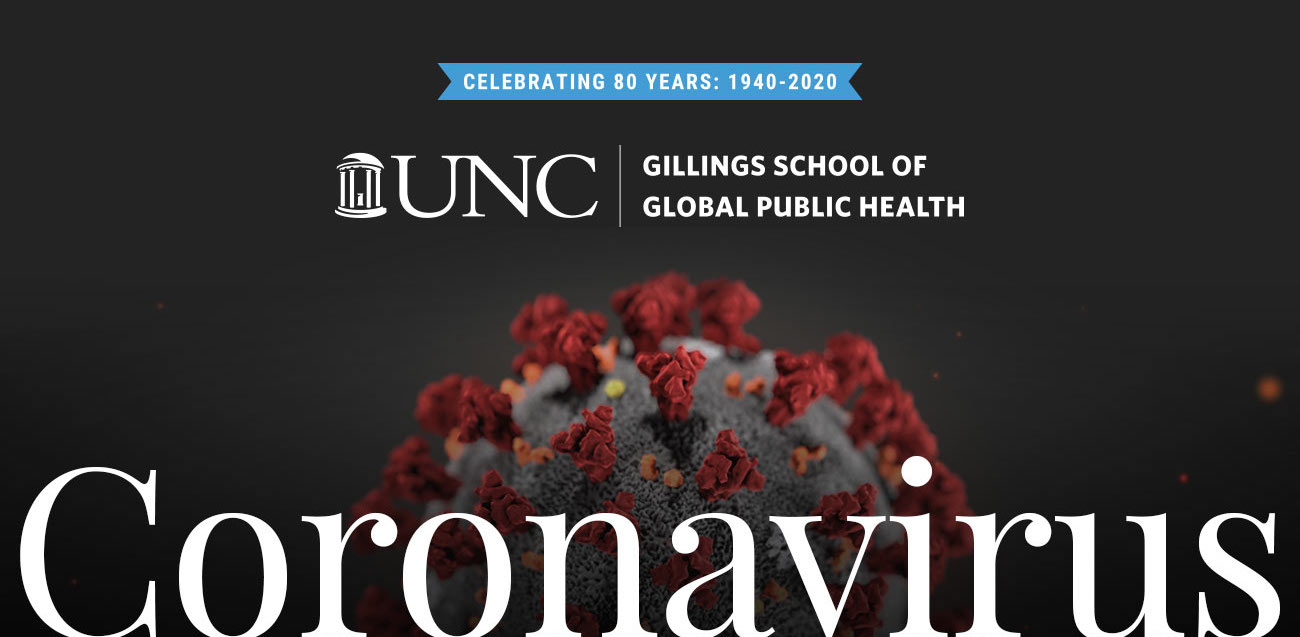The Gillings Community Responds to COVID-19: Mental Health, Environmental Guidance and Health Education

April 9, 2020
The challenge that COVID-19 poses across the globe epitomizes the importance of public health education and research. At the UNC Gillings School of Global Public Health, students, alumni and faculty from across disciplines are working tirelessly to put learning into action in the face of a global health crisis.
Health behavior alumnae design mental health solutions for COVID-19-related distress
After witnessing the impact of endless COVID-19 information streams and disruptive lifestyle changes on their networks, a team of Master of Public Health alumnae sought a way to utilize their public health background to help people manage feelings of distress and tension caused by the pandemic.
Joanna Ramirez, Karla Jimenez-Magdaleno, Nastacia Pereira, Maddy Kameny, Rebecca Payne, Samantha Luu and Supriya Sadagopan (’19 MPH, health behavior) came together during the Datavant “Hack COVID-19” Pandemic Response Hackathon on March 27-29 to brainstorm a digital health solution.
Their resulting product, COVID-19, Simplified, is a web platform that seeks to alleviate COVID-19-related distress by guiding users to a variety of existing resources based on their self-identified needs. Users navigate through a decision tree of options about their concerns, questions and feelings, ultimately arriving at clear and simple information or links to accessible, reliable external resources.
By bringing together a variety of resources to users in one platform, the founders also hope to combat the siloing of pandemic response efforts. COVID-19, Simplified is heavily informed by the principles of a peer support model and the health literacy needs of the general public.
If you are interested in contributing to the content, resources or web development of COVID-19, Simplified, please contact Samantha_luu@unc.edu.
Environmental sciences and engineering researcher and alumna contribute to World Health Organization guidance
Mark Sobsey, PhD, research professor of environmental sciences and engineering, and environmental sciences and engineering alumna Lisa Casanova (’08 PhD and associate professor at Georgia State University), recently helped write a guidance document for the World Health Organization (WHO) on water, sanitation, hygiene and waste management for the COVID-19 virus. This guidance is especially critical for water and sanitation practitioners and providers, as well as health care providers who want to know more about water, sanitation and hygiene (WaSH) risks and practices.
Casanova and Sobsey are also working together on a project to develop and evaluate simple methods to decontaminate masks and respirators that may have come into contact with COVID-19. They hope to get seed funding from the WHO on this effort and are in the midst of seeking supplemental funding from other outlets. The team will be working with Assistant Professor Mike Fisher, PhD, and Research Associate Emanuele Sozzi, PhD, MSc, who are with the UNC Water Institute and now direct the environmental virology and microbiology lab in the Department of Environmental Sciences and Engineering.
Sobsey has contributed to other WHO infection prevention and control (IPC) documents in addition to the recent WaSH and waste management guidelines. He serves on an ad hoc panel of IPC experts and a research and development subgroup, both of which have regular teleconferences to produce and revise IPC documents on COVID-19.
Recently, Sobsey was invited to write a review and analysis paper on the survival, transmission and risk of SARS-CoV-2 — the virus that causes COVID-19 — in the environment for a special issue of the International Journal of Environmental Research and Public Health. This research is pending publication in December of 2020.
Doctor of Public Health alumna leads educational effort on COVID-19 and alpha-gal syndrome
Jennifer Platt (’12 DrPH) is co-founder of Tick-Borne Conditions United, a national nonprofit based in Pittsboro. The organization specializes in education, research and advocacy on lesser-known tick-borne conditions such as alpha-gal syndrome.
Alpha-gal syndrome (AGS), a type of food allergy to red meat, often develops when a tick bite transmits an alpha-gal sugar molecule into the body. This molecule is commonly found in the meats of most mammals, such as beef, lamb, pork, venison and rabbit. It can also be found in products that contain mammal ingredients, which include some medications, vaccines, gelatin and milk products. Medications made with gelatin or gelatin capsules pose a particular risk to people with AGS.
Because many medications currently being used in the treatment of COVID-19 have ingredients that may cause a reaction for those with AGS, it’s important for people with the condition to communicate their concerns with health care providers.
To that end, Platt and colleagues at the nonprofit set up an information hub to address relevant AGS and COVID-19 concerns. The team is currently holding a series of webcast sessions with experts to answer commonly asked questions from the AGS community. The sessions are held on Sunday nights on Facebook Live and are open to the public.
For more information, contact Jennifer Platt, DrPh, at Jennifer@TBCUnited.org.
See more general information about COVID-19 at the Gillings School’s Coronavirus Information Portal.
Read more about how Gillings students and alumni are responding to the COVID-19 pandemic in our previous feature.
Find a roundup of all our experts’ coronavirus-related media outreach in this Twitter moment.
Contact the UNC Gillings School of Global Public Health communications team at sphcomm@unc.edu.
